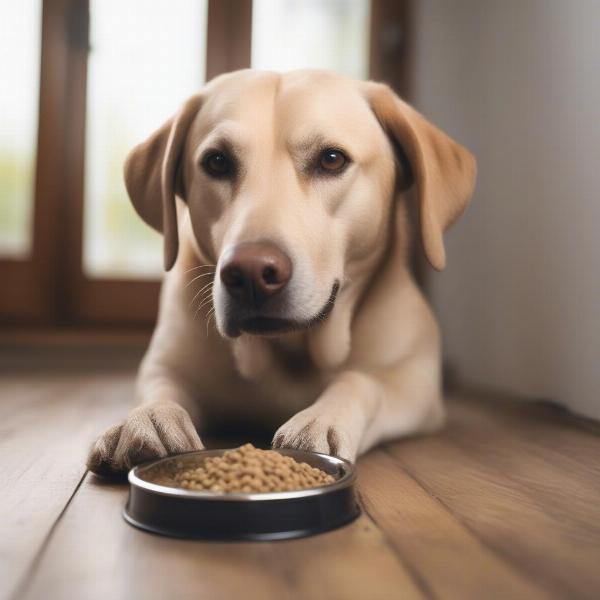Senior dog food plays a vital role in maintaining the health and well-being of our beloved older companions. As dogs age, their nutritional needs change, and choosing the right food is crucial for supporting their overall health, mobility, and cognitive function. This article will guide you through the essential aspects of senior dog food, helping you make informed decisions to ensure your furry friend enjoys a happy and healthy golden age.
Understanding the Nutritional Needs of Senior Dogs
As dogs enter their senior years, their metabolism slows down, and they may become less active. This means they require fewer calories to maintain a healthy weight. However, their need for specific nutrients, such as protein, fiber, and certain vitamins and minerals, can actually increase. Senior dogs often experience changes in their digestive systems, making it important to choose a food that is easy to digest and supports healthy gut flora. Additionally, senior dog food often contains ingredients that support joint health, cognitive function, and a healthy immune system. These ingredients can include glucosamine, chondroitin, antioxidants, and omega-3 fatty acids. Choosing the right senior dog food can significantly impact your dog’s quality of life.
Key Ingredients to Look for in Senior Dog Food
High-quality protein sources are essential for maintaining muscle mass in older dogs. Look for foods that list real meat or poultry as the primary ingredient. blue buffalo senior dog food often prioritizes high-quality protein. Fiber is also crucial for digestive health and can help prevent constipation, a common issue in senior dogs. Additionally, look for foods rich in antioxidants, which can help protect against cell damage and support a healthy immune system.
Choosing the Right Type of Senior Dog Food
Senior dog food is available in various forms, including dry kibble, wet food, and freeze-dried options. Each type has its own advantages and disadvantages. Dry kibble is often the most economical option and can help maintain dental health. orijen senior dog food is known for its high-quality dry kibble options. Wet food can be more palatable for picky eaters or dogs with dental problems, while freeze-dried options offer a convenient and nutritious alternative. Consider your dog’s individual preferences and health needs when choosing the best type of food. If you are unsure, consult with your veterinarian.
Transitioning Your Dog to Senior Food
When switching your dog to senior food, it’s important to do so gradually to avoid digestive upset. Start by mixing a small amount of the new food with their current food and gradually increase the proportion of senior food over several days. Monitor your dog for any signs of digestive problems, such as vomiting or diarrhea, and adjust the transition speed accordingly.
 A senior dog eating senior dog food
A senior dog eating senior dog food
Common Concerns about Senior Dog Food
What if my senior dog is overweight? Choose a senior dog food specifically formulated for weight management. These formulas are typically lower in calories and fat while still providing essential nutrients. wagg senior dog food offers some good options in this category.
What if my senior dog has allergies? Look for hypoallergenic senior dog food formulas that are free from common allergens like grains, chicken, and beef.
What if my senior dog is a picky eater? Try different flavors and textures of senior dog food to find one that your dog enjoys. Adding a small amount of warm water or low-sodium broth to dry kibble can also make it more appealing. advance senior dog food offers a variety of flavors that might entice even the pickiest eaters. senior dog food iams is also a popular choice for its palatability.
Conclusion
Choosing the right senior dog food is a crucial step in ensuring your aging companion enjoys a long, healthy, and happy life. By understanding your dog’s specific needs and paying attention to key ingredients, you can provide them with the optimal nutrition they need to thrive in their golden years.
FAQ
- When should I switch my dog to senior food? Most dogs can benefit from switching to senior food around 7-8 years of age, but consult with your veterinarian for specific recommendations based on your dog’s breed and health.
- How often should I feed my senior dog? Most senior dogs do well with two smaller meals per day.
- Can I give my senior dog supplements in addition to senior food? Always consult with your veterinarian before giving your dog any supplements.
- What are signs that my senior dog’s food is not agreeing with them? Look for changes in appetite, weight, stool consistency, skin, and coat.
- Is it okay to mix wet and dry senior dog food? Yes, mixing wet and dry food can be a good way to provide variety and ensure your dog is getting all the necessary nutrients.
- My senior dog has lost interest in food. What should I do? Consult with your veterinarian to rule out any underlying medical conditions. Try warming the food, adding a small amount of low-sodium broth, or switching to a more palatable senior food formula.
- How can I tell if my senior dog is getting enough nutrients? Regular vet checkups are important for monitoring your dog’s overall health and nutrient levels.
About ILM Dog
ILM Dog is your trusted international resource for expert dog care and nutrition advice. We provide comprehensive information on dog breeds, health, training, nutrition, and much more, catering to dog owners of all experience levels. Our team of expert writers and dog enthusiasts is dedicated to providing valuable and practical advice to help you provide the best possible care for your canine companion. Contact us today for personalized guidance on all aspects of dog ownership at [email protected] or +44 20-3965-8624.